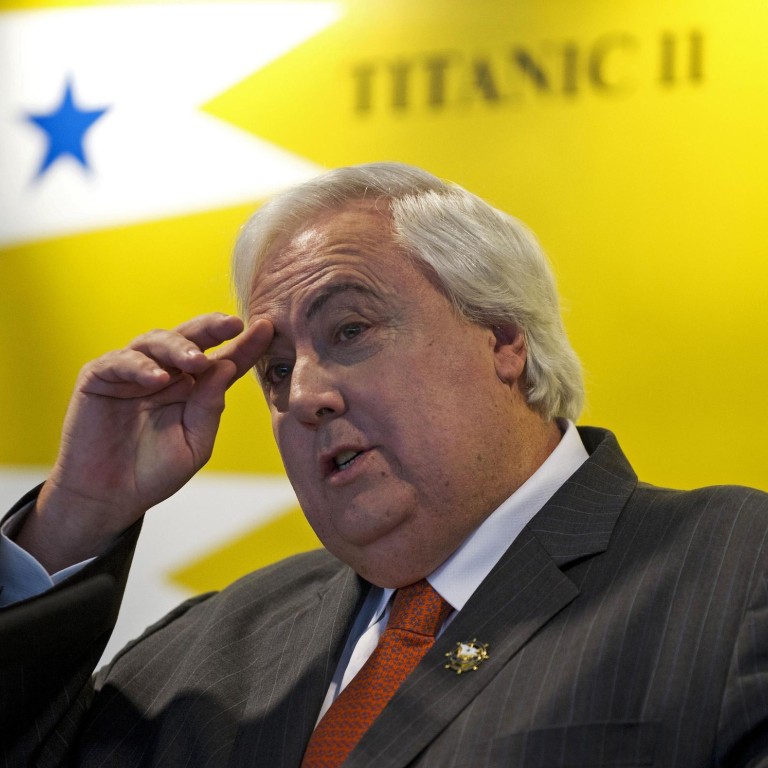
Sino Iron fiasco has Clive Palmer changing his attitude to China
Clive Palmer's tirade against China made global headlines earlier this week. But what's got the Australian mining billionaire so fired up? After all, four years ago Palmer was critical of the previous Labor government when Kevin Rudd was prime minister saying its policies made trade difficult for Chinese investors.
In a speech he called the policies "racist" and said there was "a great cry in Australia about Reds under the bed". He called on politicians to be fair and, "to treat the Chinese people and Chinese government with the dignity they deserve". However, his view has evidently soured.
This is almost entirely to do with Hong Kong-listed Citic Pacific's Sino Iron project in Western Australia. In 2006, Palmer sold Citic the right to mine magnetite iron ore in the Pilbara region in exchange for royalty payments. Citic agreed to build the infrastructure, but the "deal of the century", as analysts call it, because it heavily favours Palmer, has taken a heavy toll on Citic. The original budget of US$2.5 billion has blown out to about US$10 billion.
That is not counting the bungled US$2 billion attempt at hedging the company's Australian dollar risk that cost chairman Larry Yung Chi-kin his job. Sino Iron and Palmer are involved in a number of legal actions. But the principal dispute is about the royalties that Citic undertook to pay Palmer's company Mineralogy for shipping the ore. Palmer claims that Sino Iron owes him A$500 million (HK$3.6 billion) in unpaid royalties. Sino does not dispute this, but says the method of calculating it is unclear. The pricing of iron has changed since 2006 when the deal was negotiated.
It was to be a calculation of several things, including - unfortunately - the annual benchmark iron ore prices received by BHP Billiton at its Mount Newman mine, and the annual benchmark iron ore prices received by Brazilian miner Vale. However, that annual "benchmark price" has been abandoned and has moved to daily spot market pricing. The two parties have been unable to agree a formula and the matter is in the courts.
The judge hearing this case had criticised Mineralogy for the numerous changes it has made to its statement of claim. "Mineralogy's numerous, and sometimes very significant, changes to its case have slowed these proceedings down dramatically," the judge said. This seems a bizarre tactic since it delays Palmer's payday. Cash is something Palmer has been desperate to get his hands on as a number of his businesses are losing money and there is the Palmer United Party to fund.
It may be that Palmer has been delaying the royalty hearings until another legal dispute was settled. That is, over who operates Port Preston, from where Sino ships its ore. Preston has been declared a "security" port by the government, which means it requires a manager to oversee security and anti-terrorist measures. Mineralogy was initially put in control but in what represents a serious loss for Palmer, Mineralogy lost this to Sino on appeal this week, which may explain his somewhat wrought state.
Had he been able to control the port he would possibly have been able to disrupt Citic's iron shipments which would have strengthened his hand in his royalty negotiations. Meanwhile, Citic has upped the ante and accused Palmer of fraud in diverting A$12 million cash from an account set up to pay for the administration of the port. Citic says these funds have been used to fund Palmer's election campaign and some of his other mining assets that have been losing money. Palmer denies this but the issue is now in court. The Sino Iron project looked at one stage as if it was going to bring down Citic, but now it's Palmer that's looking wobbly.
Have you got any stories that Lai See should know about? E-mail them to [email protected]

